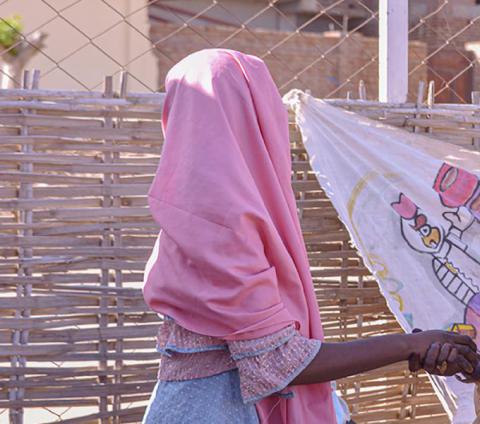Protection services and health support for an epilepsy-affected Child

“I was born in a village in West Darfur. According to my mother I started to have seizures when I was only 40 days old. Later I was diagnosed with Epilepsy. Now, I am 15 years old, and I am still suffering from the condition. However, with the current medication I got a lot better, thanks to the support of Save the Children.”
Mariam* is receiving support from our child protection team working on the ground in West Darfur.
She remembers: “It was very tough; in school the children used to call me ‘crazy’ when I fell and had my seizures. I was bullied due to my symptoms until I dropped out of class. Also, my brothers refused to sleep near me, because when I had seizures, I could not control my bladder.”
Mariam’s* father decided early on to leave the family’s home village and move to the state capital Geneina to seek health support for his eldest daughter. However, the city repeatedly experienced outbreaks of violence, putting additional stress on Mariam and her family.
“After we moved to Geneina, conflict started, and we were displaced to another gathering point. The area is very crowded, which is not good for my condition.”
Mariam’s* doctor in Geneina advised the family to seek more specialized help in Sudan’s capital Khartoum. However, with seven children and very modest financial means, the family could not cover the costs. Mariam’s father began to seek support:
“I knocked on all doors. I sent Miriam’s medical reports to several organisations asking for help” he explains. “Save the Children was the first to respond.”
After the assessment, Mariam* and her father traveled twice to Khartoum and received suitable medication for Mariam’s treatment. All trips and related costs, including the medication and health consultations were covered by Save the Children’s programmes.
Miriam adds: “We also received a lot of support beyond that, including food, a bed with mattresses and cover, clothes and shoes for me and my siblings, as well as dignity and hygiene kits.”
The child protection programme’s holistic approach means to support vulnerable children and families in an integrated way.
Now, as her health is getting better, Miriam has plans: “If the treatment goes well, I will return to school soon. I want to continue my education.”
Mariam* visits a Save the Children supported Child-Friendly Space in West Darfur, funded by the European Union. Here, she can draw and enjoy some free time activities with other children in a protected, safe environment. The team in the Child-Friendly space is also trained to support children suffering from various types of distress and trauma and, in case of more challenging issues, will refer them to the suitable health and psychological support providers.
 Sudan
Sudan